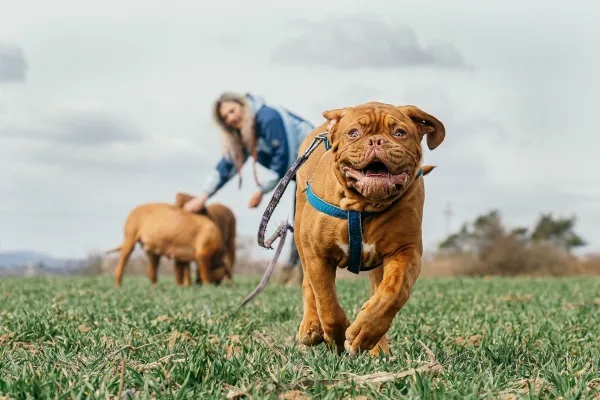It can be incredibly distressing to hear your beloved senior dog coughing and gagging, especially during the quiet of the night. The immediate concern is whether it’s a minor irritation or a sign of something more serious. While an occasional cough after eating or drinking too quickly might be normal, persistent or severe coughing warrants attention. This guide aims to demystify why your older dog might be experiencing these symptoms, offering insights into common causes and when to seek professional veterinary help.
Understanding Why Dogs Cough and Gag
Coughing and gagging are natural protective reflexes for dogs, just as they are for humans. These actions help to clear the throat and airways of foreign substances like food, water, saliva, or irritants. Understanding the basic anatomy involved can shed light on these reflexes:
The back of a dog’s mouth features two crucial openings: the esophagus, which leads to the stomach, and the trachea, which leads to the lungs. The larynx, situated at the top of the trachea, acts as a gatekeeper. It has two main defense mechanisms: the epiglottis, a flap of tissue that covers the tracheal opening during swallowing, and the vocal folds within the larynx that open for breathing and close to prevent foreign material from entering the airways.
When something other than air enters the larynx or irritates the airways, nerves signal the brain to initiate a cough or gag. This process involves a forceful expulsion of air from the lungs, designed to clear the obstruction.
Distinguishing Coughing, Gagging, and Vomiting
It’s important to differentiate between coughing, gagging, and vomiting, as they have different underlying causes and require different approaches.
Signs of a Coughing Dog:
- Short, hacking sounds.
- Chest movement associated with the cough.
- Possible expulsion of a small amount of clear fluid or saliva.
- The cough can be dry (nonproductive) or bring up mucus (productive), which the dog may swallow or spit out.
Signs of a Gagging Dog:
- The dog opens its mouth wide.
- Makes a retching or hacking sound.
- May not expel anything, or might bring up a small amount of saliva, mucus, or white foam.
- Gagging often accompanies coughing.
Signs of Nausea and Vomiting:
- Excessive salivation or lip-licking.
- Abdominal contractions accompanying the retching sound.
- Expulsion of stomach contents, which can include food, bile (yellow fluid), or foam.
 A senior black Labrador retriever sitting in a grassy field at sunset, looking alert.Laryngeal paralysis can cause coughing and harsh breathing sounds.
A senior black Labrador retriever sitting in a grassy field at sunset, looking alert.Laryngeal paralysis can cause coughing and harsh breathing sounds.
Seven Common Reasons for an Older Dog Coughing and Gagging at Night
As dogs age, their susceptibility to certain health conditions increases, which can manifest as coughing and gagging. Here are seven common culprits, particularly relevant for senior dogs experiencing these symptoms at night:
1. Laryngeal Paralysis
This condition occurs when the nerves controlling the vocal folds in the larynx malfunction. One or both vocal folds fail to open properly during inhalation, restricting airflow and leading to harsh, noisy breathing. This impairment also compromises the larynx’s ability to protect the airways, increasing the risk of aspiration pneumonia (pneumonia caused by inhaling food or liquid). Dogs with laryngeal paralysis often cough and gag frequently, and the problem can be exacerbated by excitement or exercise. Geriatric Onset Laryngeal Paralysis Polyneuropathy (GOLPP) is a broader condition that can include laryngeal paralysis, megaesophagus, and hind limb weakness.
2. Chronic Bronchitis (COPD)
Persistent coughing that lasts longer than two months, without a clear identifiable cause, may indicate chronic bronchitis, also known as Chronic Obstructive Pulmonary Disease (COPD) in dogs. This condition involves chronic inflammation of the lungs, often stemming from severe infections, trauma, or allergies. Over time, this inflammation makes it harder for the dog to clear mucus and irritants from their airways, potentially leading to scarring of lung tissue. While more common in older dogs, it’s essential to rule out other serious conditions like heart disease or lung cancer.
3. Tracheal Collapse
The trachea, or windpipe, is supported by C-shaped cartilage rings that can weaken and flatten with age. This weakening causes the trachea to narrow, making it difficult for air to pass through, leading to a characteristic “goose honk” cough, gagging, and sometimes respiratory distress. Tracheal collapse is more prevalent in older dogs and smaller breeds.
 A group of Dogue de Bordeaux dogs playing together outdoors.Respiratory infections are a common cause of cough, especially in younger dogs who visit dog parks and boarding facilities.
A group of Dogue de Bordeaux dogs playing together outdoors.Respiratory infections are a common cause of cough, especially in younger dogs who visit dog parks and boarding facilities.
4. Heart Disease
Heart disease can lead to fluid accumulation in the lungs (pulmonary edema) or abdomen. When fluid builds up in the lung tissue, the body may attempt to expel it through coughing. An enlarged heart, a common consequence of heart disease, can also press on the trachea and bronchi, triggering a cough. Older dogs with heart conditions often experience worsening coughs and gagging at night, along with fatigue and breathing difficulties.
5. Lung Cancer
Cancer in the lungs can originate there (primary lung cancer) or metastasize from other parts of the body. Tumors can obstruct airways or cause inflammation, leading to persistent coughing. Other common symptoms include weight loss, lethargy, and decreased appetite. The treatment for lung cancer depends on its type and stage and may involve chemotherapy or radiation.
6. Infections
While often associated with younger dogs, respiratory infections can affect older dogs as well. Bacteria, viruses, fungi, or parasites can infect the respiratory tract, causing inflammation and coughing. Pneumonia, an infection of the lungs, can lead to severe symptoms like fever, difficulty breathing, and lethargy. Fungal infections, in particular, can cause widespread illness.
7. Allergies
Just like humans, dogs can suffer from allergies to environmental factors such as pollen, dust mites, or mold, as well as reactions to medications, insect bites, or certain foods. Allergic reactions can cause inflammation in the airways, leading to coughing and nasal congestion. Severe allergic reactions, such as anaphylaxis, can be life-threatening and require immediate veterinary attention.
When to Seek Veterinary Care for Your Old Dog’s Coughing and Gagging
Identifying when to contact your veterinarian is crucial. While some causes are less urgent, others require immediate medical intervention.
Emergency Situations (Call Your Vet Immediately)
- Signs of Respiratory Distress: This is always an emergency. Symptoms include rapid or labored breathing, bluish or pale gums, extreme difficulty breathing, abnormal breathing sounds, shallow or rapid breaths, an outstretched neck, or a panicked expression.
- Suspected Foreign Body in the Throat: If you believe your dog has something stuck in its throat, indicated by sudden, frequent gagging, pain when swallowing, pawing at the mouth, inability to swallow, or excessive regurgitation, seek emergency care.
Non-Urgent, but Necessary Veterinary Visits
- Worsening Symptoms: If the frequency or severity of coughing and gagging is increasing.
- Concurrent Symptoms: If your dog exhibits other signs like eye or nose discharge, sneezing, fever, or lethargy.
- Pre-existing Conditions: If your dog has a history of respiratory or cardiac issues and the coughing seems worse than their usual baseline.
- Changes in Breathing: If your dog’s breathing sounds or looks different, even if they can still eat, drink, and play.
- Any Concerns: If you have any doubts or worries about your dog’s condition.
What to Expect at the Vet Visit
The diagnostic process will depend on your dog’s stability. If your dog is in respiratory distress, the immediate priority will be stabilizing their breathing with oxygen therapy and potentially intravenous medications. Once stable, your veterinarian will conduct a thorough physical examination, listening to the heart and lungs, and checking vital signs.
Further diagnostics may include:
- Bloodwork: To assess red and white blood cell counts and organ function.
- X-rays: To examine the heart, lungs, trachea, and esophagus for abnormalities.
- Heartworm Test: To rule out heartworm infection.
- Laryngeal Exam: A sedated examination to check for laryngeal paralysis.
- Cardiac Diagnostics: Blood pressure measurements, ECG, and echocardiogram to evaluate heart health.
- Airway Evaluation: Bronchoscopy or fluoroscopy to assess the trachea and smaller airways.
Based on the diagnosis, your veterinarian will develop a tailored treatment plan.
At-Home Remedies for Coughing and Gagging (Use with Caution and Veterinary Guidance)
These remedies are supplementary and should not replace veterinary care. Always consult your vet before attempting any at-home treatments.
Change Environment
If you suspect environmental irritants like smoke or strong fragrances are causing the cough, move your dog to a different room or outdoors.
Humidify the Air
For mild upper respiratory infections, a humidifier can help moisten the airways and loosen mucus. Alternatively, you can create a steamy environment by running a hot shower in a closed bathroom for about 15 minutes. Be cautious with brachycephalic (short-nosed) breeds, as they can overheat easily.
Coupage
Gently patting your dog’s rib cage with a cupped hand for a few minutes on each side can help loosen mucus in the lower airways, making it easier to cough up. This should be done while they are breathing humidified air.
- Important Cautions: Avoid steamy bathrooms for brachycephalic dogs or dogs with heart conditions or elevated respiratory rates without veterinary approval. Never place your pet inside the shower stall or tub with hot water running due to burn risks.
Partnering with Your Veterinarian for Your Dog’s Health
It’s understandable to feel anxious when your senior dog is experiencing coughing and gagging. However, by understanding the potential causes and knowing when to seek professional help, you can work effectively with your veterinarian. Recording a video of the episodes can be invaluable for diagnosis. Whether the cause is common or rare, your vet can help create a management plan to improve your dog’s quality of life, and in many cases, significantly reduce or even eliminate coughing and gagging. Even in the face of serious diagnoses like heart failure or cancer, there are ways to ensure your dog remains comfortable and cherished. Always prioritize immediate veterinary attention if your dog exhibits signs of respiratory distress.
Disclaimer: This article provides general information and is not a substitute for professional veterinary advice. If you suspect your dog is experiencing a medical issue, please consult your veterinarian immediately.
